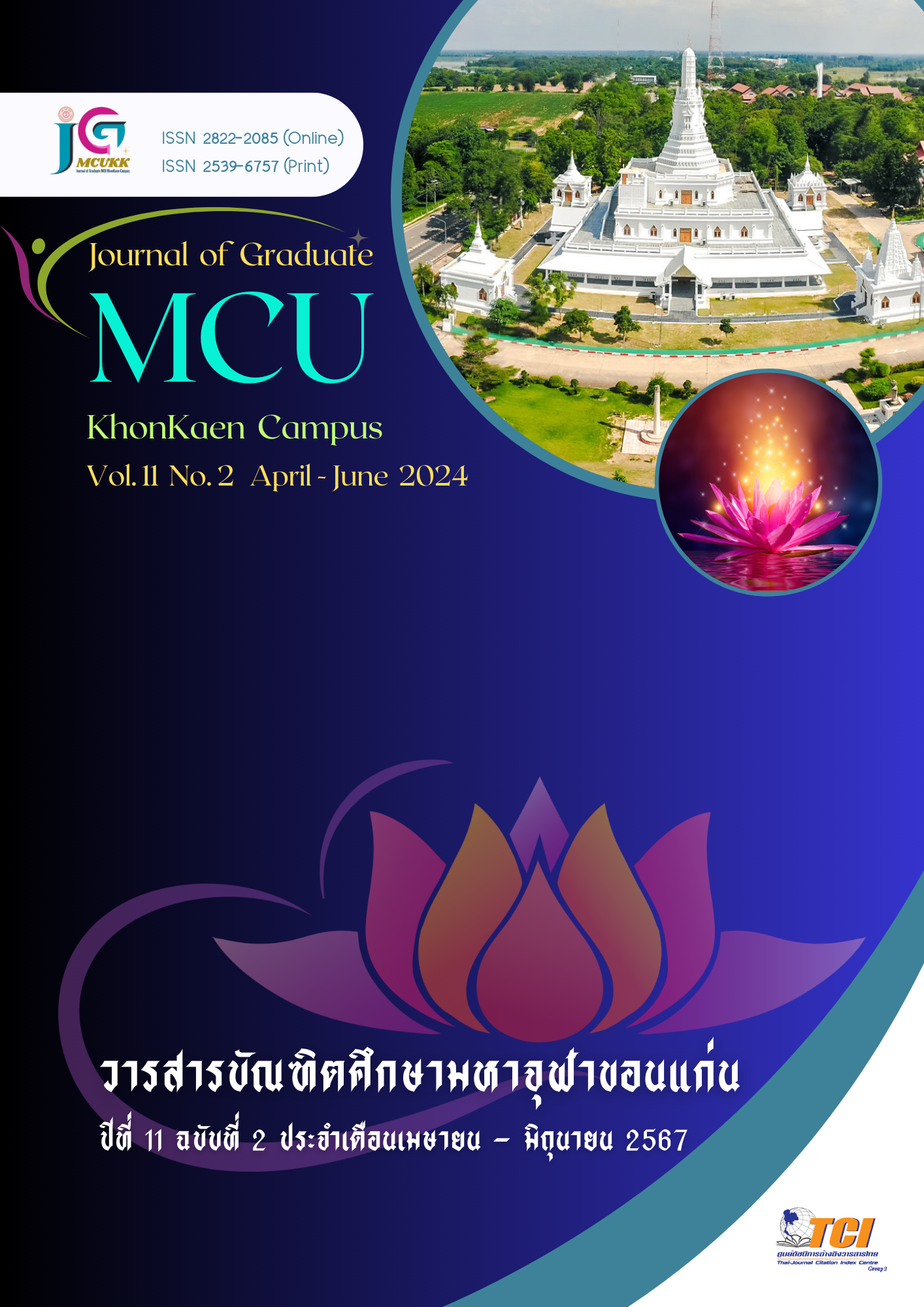แนวทางการนิเทศของสำนักงานพระสอนศีลธรรม มหาวิทยาลัยมหาจุฬาลงกรณราชวิทยาลัย
Main Article Content
บทคัดย่อ
การวิจัยครั้งนี้มีวัตถุประสงค์เพื่อ 1) ศึกษาสภาพการนิเทศของสำนักงานพระสอนศีลธรรม มหาวิทยาลัยมหาจุฬาลงกรณราชวิทยาลัย 2) ศึกษาวิธีการนิเทศของสำนักงานพระสอนศีลธรรม มหาวิทยาลัยมหาจุฬาลงกรณราชวิทยาลัย และ 3) เสนอแนวทางการนิเทศของสำนักงานพระสอนศีลธรรม มหาวิทยาลัยมหาจุฬาลงกรณราชวิทยาลัย โดยเก็บรวบรวมข้อมูลแบบสอบถามจากพระสอนศีลธรรม จำนวน 242 รูป ใช้สถิติวิเคราะห์ข้อมูลหาค่าเฉลี่ยและส่วนเบี่ยงเบนมาตรฐาน และวิเคราะห์เนื้อหาจากผลการสัมภาษณ์ผู้ทรงคุณวุฒิ 15 ท่าน
ผลการวิจัย พบว่า
1. สภาพการนิเทศของสำนักงานพระสอนศีลธรรม ทั้ง 4 ด้าน ของพระสอนศีลธรรม โดยภาพรวมอยู่ในระดับมาก เมื่อพิจารณาเป็นรายด้านพบว่าอยู่ในระดับมากทุกด้าน เรียงลำดับค่าเฉลี่ยมากไปหาน้อยได้แก่ ด้านประสานสร้างมิตร ด้านร่วมคิดร่วมทำ ด้านเรียนรู้ไปด้วยกัน และด้านสร้างสรรค์ผลงานตามลำดับความสำคัญ
2. ผลการศึกษาวิธีการนิเทศของสำนักงานพระสอนศีลธรรม มหาวิทยาลัยมหาจุฬาลงกรณราชวิทยาลัย ประกอบด้วยวิธีการ ดังนี้ 1) ด้านประสานสร้างมิตร สร้างเครือข่ายประสานงานที่มั่นคงและยั่งยืน 2) ด้านร่วมคิดร่วมทำ จัดกิจกรรมแลกเปลี่ยนประสบการณ์เรียนรู้ 3) ด้านเรียนรู้ไปด้วยกันมีการให้คำปรึกษาและอำนวยความสะดวกในลักษณะกัลยาณมิตร 4) ด้านสร้างสรรค์ผลงาน นำนวัตกรรมใหม่ ๆ มาบูรณาการให้เข้ากับผู้เรียนในแต่ละยุคสมัย
3. เสนอแนวทางการนิเทศของสำนักงานพระสอนศีลธรรม มหาวิทยาลัยมหาจุฬาลงกรณราชวิทยาลัย ดังต่อไปนี้ วิเคราะห์โครงสร้างหลักสูตรการนิเทศที่ส่งเสริมการพัฒนาระบบการประสานงานระหว่างผู้นิเทศกับผู้รับการนิเทศให้มีความทันสมัย รวดเร็วทั้งออนไลน์และออนไซต์ ทำให้สะดวกในการติดต่อสื่อสารแนะนำกระบวนการจัดการเรียนรู้ได้อย่างชัดเจนและมีประสิทธิภาพ เกิดแนวคิดใหม่ ๆ สามารถออกแบบกิจกรรมการเรียนรู้ที่มีความหมายต่อตัวผู้เรียนในสังคมปัจจุบัน
Article Details

อนุญาตภายใต้เงื่อนไข Creative Commons Attribution-NonCommercial-NoDerivatives 4.0 International License.
เอกสารอ้างอิง
พระครูกิตติญาณวิสิฐ (ธนา หอมหวล). (2561). บทบาทของพระสงฆ์ต่อการพัฒนางานดานการศึกษา. (วิทยานิพนธ์พุทธศาสตรดุษฎีบัณฑิต). พระนครศรีอยุธยา: มหาวิทยาลัยมหาจุฬาลงกรณราชวิทยาลัย.
พระครูปลัดเมธาลักษณ์ ฐิตโสภโณ. (2561). กระบวนการจัดการเรียนการสอนกลุ่มสาระวิชาสังคมศึกษา ศาสนา และวัฒนธรรม ตามหลักพุทธวิธีสำหรับพระสอนศีลธรรมในโรงเรียนสังกัดสำนักงานเขตพื้นที่การศึกษาประถมศึกษา. (วิทยานิพนธ์พุทธศาสตรดุษฎีบัณฑิต). พระนครศรีอยุธยา: มหาวิทยาลัยมหาจุฬาลงกรณราชวิทยาลัย.
พระชินวุฒิ อภิชาโต (แก้วมาลา). (2561). สภาพและปัญหาการจัดการเรียนการสอนวิชาพระพุทธศาสนาในโรงเรียนมัธยมศึกษา เขตดุสิต กรุงเทพมหานคร. (วิทยานิพนธ์พุทธศาสตรมหาบัณฑิต). พระนครศรีอยุธยา: มหาวิทยาลัยมหาจุฬาลงกรณราชวิทยาลัย.
พระบุญเลิศ สีลเตโช (จันทร์ทลา). (2564). แนวทางการพัฒนาการจัดการเรียนการสอนยุคดิสรัปชันของอาจารย์ในมหาวิทยาลัยมหาจุฬาลงกรณราชวิทยาลัย. (วิทยานิพนธ์พุทธศาสตรมหาบัณฑิต). พระนครศรีอยุธยา: มหาวิทยาลัยมหาจุฬาลงกรณราชวิทยาลัย.
พระปิติพร วิชฺชากโร (ขันธนันท์). (2561). ประสิทธิภาพการสอนวิชาพระพุทธศาสนาของพระสอนศีลธรรมในโรงเรียนประถมศึกษา อำเภอเมือง จังหวัดสมุทรปราการ. (วิทยานิพนธ์พุทธศาสตรมหาบัณฑิต). พระนครศรีอยุธยา: มหาวิทยาลัยมหาจุฬาลงกรณราชวิทยาลัย.
พระมหานุศักดิ์ จันทราลักษณ์. (2548). ปัญหาและแนวทางแก้ปัญหาทางบริหารการบริหารจัดการวัดของเจ้าอาวาส ในจังหวัดมหาสารคาม. (รายงานวิจัย). มหาสารคาม: มหาวิทยาลัยมหาสารคาม.
พระศรีธรรมภาณี และคณะ. (2564). การพลิกโฉมพระสอนศีลธรรม : การพัฒนาพระบริหารการนิเทศพระนิเทศและพระสอนศีลธรรมเพื่อสร้างพลังขับเคลื่อนศีลธรรมในสังคมไทย. (รายงานวิจัย). พระนครศรีอยุธยา: มหาวิทยาลัยมหาจุฬาลงกรณราชวิทยาลัย.
พระศรีธรรมภาณี และคณะวิจัย. (2564). อนาคตภาพพระสอนศีลธรรมเพื่อยกระดับการสอนวิชาพระพุทธศาสนาในสังคมชีวิตวิถีใหม่. (รายงานวิจัย). พระนครศรีอยุธยา: มหาวิทยาลัยมหาจุฬาลงกรณราชวิทยาลัย.
พระสายสิทธิ์ สารโท (สิทธิโท). (2561). แนวทางการพัฒนาการเรียนการสอนตามหลักพหูสูต 5 ของพระสอนศีลธรรมในสถานศึกษา สังกัดสำนักงานเขตพื้นที่การศึกษาประถมศึกษาร้อยเอ็ด. (วิทยานิพนธ์พุทธศาสตรมหาบัณฑิต). พระนครศรีอยุธยา: มหาวิทยาลัยมหาจุฬาลงกรณราชวิทยาลัย.
พระสารัตน์ ฐิตปุญฺโญ (เลี้ยงศรี). (2563). แนวทางการพัฒนานวัตกรรมการจัดการเรียนรู้ตามแผนการศึกษาแห่งชาติ 20 ปี (2560 - 2579) ของครูโรงเรียนประถมศึกษา สังกัดสำนักงานเขตพื้นที่การศึกษาประถมศึกษา สุราษฎร์ธานี เขต 1. (วิทยานิพนธ์พุทธศาสตรมหาบัณฑิต). พระนครศรีอยุธยา: มหาวิทยาลัยมหาจุฬาลงกรณราชวิทยาลัย.
พระอนุสรณ์ อนุสฺสโร (พรหมโพธิ์). (2561). แนวทางการจัดกิจกรรมการเรียนการสอนจริยธรรมของโรงเรียนประถมศึกษา อําเภอเมือง จังหวัดสมุทรปราการ. (วิทยานิพนธ์พุทธศาสตรมหาบัณฑิต). พระนครศรีอยุธยา: มหาวิทยาลัยมหาจุฬาลงกรณราชวิทยาลัย.
พระอุทัยปริยัติโกศล (เสถียร ยอดสังวาลย์). (2561). รูปแบบการบริหารจัดการตามหลักไตรสิกขาของศูนย์ศึกษาพระพุทธศาสนาวันอาทิตย์ในจังหวัดภาคกลาง. (วิทยานิพนธ์พุทธศาสตรดุษฎีบัณฑิต). พระนครศรีอยุธยา: มหาวิทยาลัยมหาจุฬาลงกรณราชวิทยาลัย.
ศักดิ์รพี พันพา. (2558). สภาพการจัดการเรียนการสอนของพระสอนศีลธรรมในโรงเรียนกรุงเทพมหานคร. (วิทยานิพนธพุทธศาสตรมหาบัณฑิต). พระนครศรีอยุธยา: มหาวิทยาลัยมหาจุฬาลงกรณราชวิทยาลัย.

